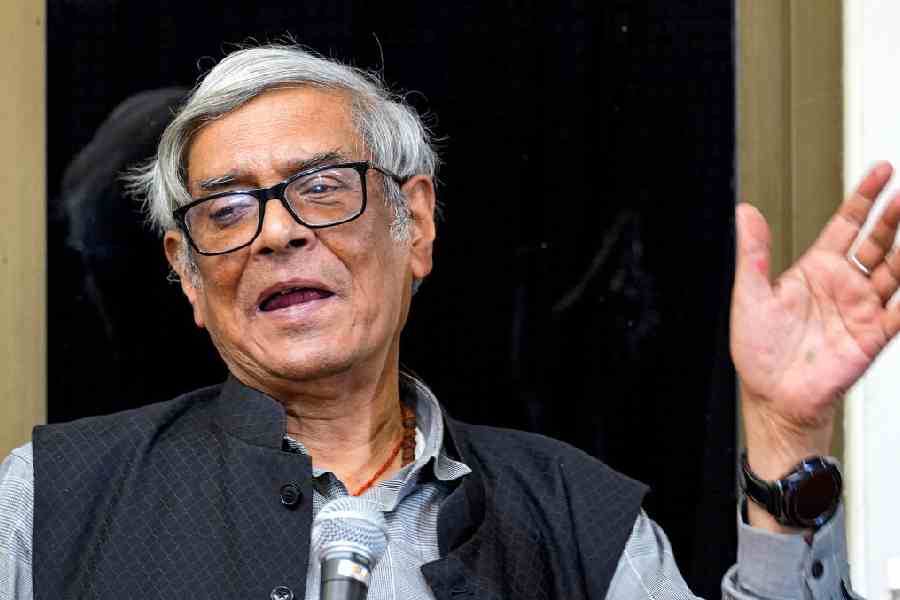Bibek Debroy, a key economic adviser to Prime Minister Narendra Modi, died on Friday aged 69.
An unconventional economist, Debroy often courted controversy with his provocative ideas that at times alarmed even his most ardent supporters.
In August last year, he triggered furious debate when he advocated the need to draw up a new Constitution for India. He argued that “amendments will not do… we need to go back to the drawing board and start from first principles”.
The premise of his argument was that the existing Constitution had failed to completely shake off the shackles of a colonial past because it was “largely based on the Government of India Act of 1935”.
Even though the Modi government quickly distanced itself from his views, the remark became a rallying cry for Opposition parties with the Congress-led coalition launching a campaign to “save the Constitution” ahead of the 2024 general election.
Debroy had grabbed headlines in 2017 too when he floated the idea of taxing agriculture above a certain threshold in order to expand the tax base. He argued that there ought to be no distinction between urban and rural incomes — an idea that inflamed passions in the corridors of power and the farmlands of the country.
Agricultural income in India is exempt from income tax under Section 10(1) of the Income Tax Act, 1961. There is no limit on the exemption which, Debroy argued, allowed rich people to evade taxes by classifying a large portion of their income to agricultural pursuits. An alarmed Arun Jaitley, the
finance minister at that time, had to categorically state that the Modi government had no desire to tax farmers.
Debroy will be remembered as much for his contributions to economic thought and governance as for his scholarly translations, including major works like the Puranas, Valmiki’s Ramayana, and the Mahabharata. His interests extended to a wide range of subjects, from Sanskrit literature to railway reforms and even the cultural place of dogs in India, marking him as an intellectual polymath. His career in economic policy spanned topics such as economic liberalisation, inequality and infrastructure financing.
Born and educated in Calcutta, Debroy studied at the Ramakrishna Mission School in Narendrapur and Presidency College before moving to Delhi School of Economics and Trinity College, Cambridge. He began his career focussing on trade and legal reforms in the 1980s.
As a director of research at the Rajiv Gandhi Institute of Contemporary Studies, he sparked a storm by publishing a report that ranked Gujarat as India’s top state for economic freedom, deeply embarrassing the Congress and the Prime Minister Manmohan Singh-led UPA regime at the Centre.
The study, funded by Germany’s Friedrich Naumann Foundation, reportedly led to his reassignment, as some felt the findings implicitly praised Gujarat’s pro-business policies under then chief minister Narendra Modi.
More recently, in September, Debroy resigned as Chancellor of the Gokhale Institute of Politics and Economics (GIPE) following Bombay High Court’s decision to reinstate vice-chancellor Ajit
Ranade, whom Debroy had earlier supported in a leadership dispute. The episode capped a tenure marked by administrative tensions at GIPE, where Debroy had served since July.
Over his decades-long career, Debroy held multiple government positions, including chairman of the finance ministry’s Expert Committee for Infrastructure Classification and Financing and a full-time member of the government’s economic think tank, NITI Aayog. He was awarded the Padma Shri in 2015 for
his contributions to public
service and scholarship.
Debroy also chaired the Indian Railways Reform Committee, which recommended that private operators should be allowed to operate trains. It also suggested the elimination of a separate railway budget and the implementation of commercial accounting
systems that would eliminate subsidies.
Drawing inspiration from Britain’s privatisation of British Rail in 1993, Debroy’s recommendations faced a significant backlash from labour unions and government bodies amid concerns about job losses and steep fare hikes. Though the government merged the railway budget with the general budget, it refrained from fully implementing his more ambitious proposals.
However, in March 2020, the railways announced they were planning to introduce 150 passenger trains through private operators under a public-private partnership (PPP) mode — drawing on the suggestion that had been floated by the Debroy-led committee on railway reforms.
In addition to his economic and policy work, Debroy was a prolific writer. In his final column, submitted to The Indian Express shortly before his death, he reflected on mortality after spending time in a cardiac care unit. “What if I am not there? What indeed?” he mused. He noted wryly: “A few condolences, perhaps even from important people. ‘Irreparable loss.’ Perhaps a posthumous Padma Bhushan or Padma Vibhushan.”
Bibek Debroy’s legacy is a mix of intellectual rigour and controversy, reflecting his willingness to challenge any form of orthodoxy. Though his ideas were divisive, his impact on Indian economic thought and policy discourse remains substantial.










